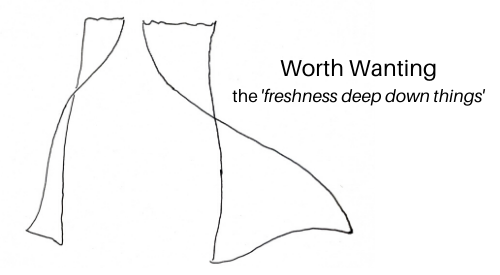
What do we like about freshness? What does freshness like about us? These are the kinds of questions that might cause a pause if it arose in conversation between any partners. Leaving aside the issue of commitment which is what love adds to like, liking is about appreciation of the otherness of the other, of the other as other.
So, regarding transcendent freshness and mundane humanity: what attracts one to the other, beside mere utility, if there be any?
There are lots of books about improbable animal friends: the big horse, say, and the relatively miniscule dog. But friendship between freshness and humanity is more like that between humans and octopi, two very, very different species.
My contention is that there is a space where we and freshness do meet and do so gladly. This is the encounter. Usually we also meet some other other there in addition to freshness, and that other we might find attractive or not. But what is freshness like in and of itself that we are drawn to it? What are we like that it is drawn to us. What makes us care about each other?
Let’s make a list, and start with freshness as we come to know it through encounter experiences. What freshness is outside that space we have infer, but In encounters we meet a non-hypothetical presence.
What about power? Does freshness change the reality around it in a way that’s interesting?
First of all, freshness is fresh. We regularly feel hemmed in by walls and closed windows, and surrounded by things dead, dying or in dire need. We feel incipient rigor mortis in our bodies and souls. Our spirits droop. To this, freshness comes as ambassador of openness and expanse, of revived interest, of inexhaustible wealth of surprises, unsuspected or unpredictable, and is so refreshing, so reinvigorating.
Second, freshness imparts an intrinsic value to encounters which we experience as an glow of worthwhileness during or afterwards. Freshness makes events into occasions, and occasions into world-makings. The ephemeral becomes the lasting.
Together, these two transcendent ‘powers’ of refreshment and worthwhileness impact us as viscerally as warm sunshine does on a winter day. By contrast, confirming the presence of freshness by counting its manifestations in our encounters is more inferential, like tracking, as someone said, the hat on the head of an invisible man.
The a priori attribution of omniscience and omnipotence to the transcendent is incompatible with the genuine freedom and open-endedness of encounters, and so not descriptive of freshness and the way it works.
What about style?
Freshness is never rushes, never dawdles, but exerts a steady, persistent pressure on us to respond and encounter. Freshness has one agenda: making encounters occur, and is seriously single-minded, subtle, and opportunistic in the furtherance of that. Freshness is sincere, never ironic. It never deceives, nor is ever deceived. This may make freshness sound boring, a ‘straight arrow’, or a ‘goody two shoes.’ But freshness in encounters can party along with the participants.
Freshness is busy, but never a busybody, ever wooing us to encounter, ever listening for our speech, ever introducing us to each other, ever treasuring each encounter ‘minted’, and grieving each one missed, ever bringing into being, encounter by encounter, that longed-for consummation, and ever excited by what shape it will take. Freshness is impartial, but definitely not impassive.
What about motives?
Freshness has a pure love of livingness, that play of actuality and potentiality going on at the boundary between self and other. Freshness has a granular interest in each one of us down to that level of intimacy, as well as a general interest in all of us as encounterers. In our encounters, we feel freshness make common cause with us personally, particularly through stances of solidarity, that is activities of friendship, hospitality and exploration.
On the other hand, we find freshness frustrating when it takes no responsibility for the way the world is or for how to make it better or righter. It does, however, accompany us with interest and empathy through the nitty-gritty of our mundane lives. The only impact freshness has on the mundane is through encounters.
These powers, style and motives are not attributes such as found in a dating site profile, but attempts at characterizing something or someone we find in our encounter experiences appealing, engaging, attractive. Freshness is fun to have around, something always something cooking.
The second question: what about us interests freshness? It’s easy for us to be dismissive of our own humanity. We know too well how nasty we are, how unreliable and ornery, how disappointing we can be to ourselves and others. Then there’s our embarrassing corporality and our humiliating mortality. Then, even when our best impulses are summoned forth, they are often cut short or constricted by the mundane circumstances of our existence. The whole show is pitiable, if not risible.
Freshness sees us differently, not ignoring all the considerations above, but understanding the poignancy of our situation.
Indeed, our finitude and fragility, as well as our locality, give each of us minute by minute, place by place, situation by situation, particular perspectives which freshness loves to engage with in our encounters, as we do with works of art. Also, we humans have a sense of humor and irony which freshness finds fascinating.
Any of our expressions of courage, generosity or loyalty (without complicity or exclusivity) in the context of our fraught and harried existences is impressive to freshness, as is our resourcefulness in difficult situations, as is our readiness to invite freshness into our lives.
Finally, in the course of encounters, we are playmates of freshness, and since encounters have fresh futures forever, those instances of camaraderie represent, for freshness, perpetual and compounding occasions of joy.
By the way, I have no idea if it’s only humanity that has encounters with freshness; perhaps octopi do too.
What it is that freshness isn’t invited into goes the way of all flesh, but what freshness is allowed to participate in…Ah, that’s pure glory–continual for freshness, though intermittent for us in the here and now.
Liking, not likes as they works on social media relative to this photograph or that comment, but each liking the other as itself, is the basis of our relationship with freshness, and of freshness with us. As when friends in the past corresponded, we, see much that connects us, freshness and humanity, much that makes us want to share our news, share ourselves, share our longing to be again together.
